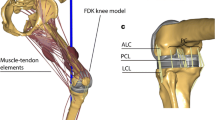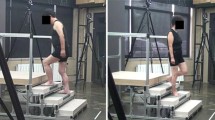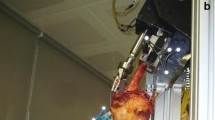Abstract
Purpose
Actions requiring deep knee flexion, such as kneeling and squatting, are challenging to perform after total knee replacement (TKR), though many manufactures emphasize that their knee prostheses could safely achieve high flexion. Little is known about the patellofemoral kinematics during deep flexion. This study aimed to track the movement of the patella during kneeling and squatting through dynamic computational simulation.
Methods
A validated knee model was used to analyse the patellar kinematics after TKR, including shifting, tilting and rotation. The data were captured from full extension to 135° of knee flexion. For kneeling, an anterior force of 500 N was applied perpendicularly on the tibial tubercle as the knee flexed from 90° to 135°. For squatting, a ground reaction force was applied through the tibia from full extension to 135° of flexion.
Results
This study found that patellar shifting and rotation in kneeling were similar to those while squatting. However, during kneeling, the patella had a greater medial tilt and showed signs of abrupt patellar tilt owning to an external force being concentrated on the tibial tubercle.
Conclusions
In terms of squatting and kneeling movements, the latter is a more strenuous action for the patellofemoral joint after TKR due to the high forces acting on the tibial tubercle. It is suggested that overweight patients or those requiring high flexion should try to avoid kneeling to reduce the risk of the polyethylene wear. Further modification of trochlear geometry may be required to accommodate abrupt changes in patellar tilting.
Level of evidence
II.





Similar content being viewed by others
References
Argenson JN, Parratte S, Ashour A, Saintmard B, Aubaniac JM (2012) The outcome of rotating-platform total knee arthroplasty with cement at a minimum of ten years of follow-up. J Bone Joint Surg Am 94(7):638–644
Argenson JN, Scuderi GR, Komistek RD, Scott WN, Kelly MA, Aubaniac JM (2005) In vivo kinematic evaluation and design considerations related to high flexion in total knee arthroplasty. J Biomech 38(2):277–284
Baldwin MA, Clary CW, Fitzpatrick CK, Deacy JS, Maletsky LP, Rullkoetter PJ (2012) Dynamic finite element knee simulation for evaluation of knee replacement mechanics. J Biomech 45(3):474–483
Bercovy M, Beldame J, Lefebvre B, Duron A (2012) A prospective clinical and radiological study comparing hydroxyapatite-coated with cemented tibial components in total knee replacement. J Bone Joint Surg Br 94(4):497–503
Bull AM, Katchburian MV, Shih YF, Amis AA (2002) Standardisation of the description of patellofemoral motion and comparison between different techniques. Knee Surg Sports Traumatol Arthrosc 10(3):184–193
Cheng CK, Huang CH, Liau JJ, Huang CH (2003) The influence of surgical malalignment on the contact pressures of fixed and mobile bearing knee prostheses—a biomechanical study. Clin Biomech 18(3):231–236
Chew JT, Stewart NJ, Hanssen AD, Luo ZP, Rand JA, An KN (1997) Differences in patellar tracking and knee kinematics among three different total knee designs. Clin Orthop Relat Res 345:87–98
D’Lima DD, Patil S, Steklov N, Chien S, Colwell CW Jr (2007) In vivo knee moments and shear after total knee arthroplasty. J Biomech 40(Suppl 1):S11–S17
Elbert K, Bartel D, Wright T (1995) The effect of conformity on stresses in dome-shaped polyethylene patellar components. Clin Orthop Relat Res 317:71–75
Fitzpatrick CK, Baldwin MA, Ali AA, Laz PJ, Rullkoetter PJ (2011) Comparison of patellar bone strain in the natural and implanted knee during simulated deep flexion. J Orthop Res 29(2):232–239
Godest AC, Beaugonin M, Haug E, Taylor M, Gregson PJ (2002) Simulation of a knee joint replacement during a gait cycle using explicit finite element analysis. J Biomech 35(2):267–275
Goldstein MJ, Ast MP, Dimaio FR (2012) Acute posttraumatic catastrophic failure of a second-generation, highly cross-linked ultra-high-molecular-weight polyethylene patellar component. Orthopedics 35(7):e1119–e1121
Hamai S, Miura H, Higaki H, Matsuda S, Shimoto T, Sasaki K, Yoshizumi M, Okazaki K, Tsukamoto N, Iwamoto Y (2008) Kinematic analysis of kneeling in cruciate-retaining and posterior-stabilized total knee arthroplasties. J Orthop Res 26(4):435–442
Han HS, Kang SB, Yoon KS (2007) High incidence of loosening of the femoral component in legacy posterior stabilised-flex total knee replacement. J Bone Joint Surg Br 89(11):1457–1461
Hashemi J, Chandrashekar N, Slauterbeck J (2005) The mechanical properties of the human patellar tendon are correlated to its mass density and are independent of sex. Clin Biomech 20(6):645–652
Hassaballa M, Vale T, Weeg N, Hardy JR (2002) Kneeling requirements and arthroplasty surgery. Knee 9(4):317–319
Heinert G, Kendoff D, Preiss S, Gehrke T, Sussmann P (2011) Patellofemoral kinematics in mobile-bearing and fixed-bearing posterior stabilised total knee replacements: a cadaveric study. Knee Surg Sports Traumatol Arthrosc 19(6):967–972
Huddleston JI, Scarborough DM, Goldvasser D, Freiberg AA, Malchau H (2009) 2009 Marshall Urist Young Investigator Award: how often do patients with high-flex total knee arthroplasty use high flexion? Clin Orthop Relat Res 467(7):1898–1906
Iwaki H, Pinskerova V, Freeman MA (2000) Tibiofemoral movement 1: the shapes and relative movements of the femur and tibia in the unloaded cadaver knee. J Bone Joint Surg Br 82(8):1189–1195
Kessler O, Patil S, Colwell CW Jr, D’Lima DD (2008) The effect of femoral component malrotation on patellar biomechanics. J Biomech 41(16):3332–3339
Kuroyanagi Y, Mu S, Hamai S, Robb WJ, Banks SA (2012) In vivo knee kinematics during stair and deep flexion activities in patients with bicruciate substituting total knee arthroplasty. J Arthroplasty 27(1):122–128
Kwang Am Jung M, Lee SC, Hwang SH, Kim SM (2008) Fracture of a second-generation highly cross-linked UHMWPE tibial post in a posterior-stabilized Scorpio knee system. Orthopedics 31(11):1137
Lin KJ, Huang CH, Liu YL, Chen WC, Chang TW, Yang CT, Lai YS, Cheng CK (2011) Influence of post-cam design of posterior stabilized knee prosthesis on tibiofemoral motion during high knee flexion. Clin Biomech 26(8):847–852
Liu YL, Lin KJ, Huang CH, Chen WC, Chen CH, Chang TW, Lai YS, Cheng CK (2011) Anatomic-like polyethylene insert could improve knee kinematics after total knee arthroplasty–a computational assessment. Clin Biomech 26(6):612–619
Ma HM, Lu YC, Kwok TG, Ho FY, Huang CY, Huang CH (2007) The effect of the design of the femoral component on the conformity of the patellofemoral joint in total knee replacement. J Bone Joint Surg Br 89(3):408–412
Manopoulos P, Havet E, Pearce O, Lardanchet JF, Mertl P (2012) Mid- to long-term results of revision total knee replacement using press-fit intramedullary stems with cemented femoral and tibial components. J Bone Joint Surg Br 94(7):937–940
Meftah M, Ranawat AS, Ranawat CS (2012) Safety and efficacy of a rotating-platform, high-flexion knee design three- to five-year follow-up. J Arthroplasty 27(2):201–206
Merican AM, Ghosh KM, Baena FR, Deehan DJ, Amis AA (2012) Patellar thickness and lateral retinacular release affects patellofemoral kinematics in total knee arthroplasty. Knee Surg Sports Traumatol Arthrosc. doi:10.1007/s00167-012-2312-z
Merican AM, Ghosh KM, Iranpour F, Deehan DJ, Amis AA (2011) The effect of femoral component rotation on the kinematics of the tibiofemoral and patellofemoral joints after total knee arthroplasty. Knee Surg Sports Traumatol Arthrosc 19(9):1479–1487
Merkow RL, Soudry M, Insall J (1985) Patellar dislocation following total knee replacement. J Bone Joint Surg Am 67(9):1321–1327
Monk AP, van Duren BH, Pandit H, Shakespeare D, Murray DW, Gill HS (2012) In vivo sagittal plane kinematics of the FPV patellofemoral replacement. Knee Surg Sports Traumatol Arthrosc 20(6):1104–1109
Nutton RW, van der Linden ML, Rowe PJ, Gaston P, Wade FA (2008) A prospective randomised double-blind study of functional outcome and range of flexion following total knee replacement with the NexGen standard and high flexion components. J Bone Joint Surg Br 90(1):37–42
Pruitt LA, Ansari F, Kury M, Mehdizah A, Patten EW, Huddlestein J, Mickelson D, Chang J, Hubert K, Ries MD (2013) Clinical trade-offs in cross-linked ultrahigh-molecular-weight polyethylene used in total joint arthroplasty. J Biomed Mater Res B Appl Biomater 101(3):476–484
Seon JK, Park SJ, Lee KB, Yoon TR, Kozanek M, Song EK (2009) Range of motion in total knee arthroplasty: a prospective comparison of high-flexion and standard cruciate-retaining designs. J Bone Joint Surg Am 91(3):672–679
Sharma A, Leszko F, Komistek RD, Scuderi GR, Cates HE Jr, Liu F (2008) In vivo patellofemoral forces in high flexion total knee arthroplasty. J Biomech 41(3):642–648
Stoddard JE, Deehan DJ, Bull AM, McCaskie AW, Amis AA (2013) No difference in patellar tracking between symmetrical and asymmetrical femoral component designs in TKA. Knee Surg Sports Traumatol Arthrosc. doi:10.1007/s00167-013-2534-8
Tsumori Y, Yoshiya S, Kurosaka M, Kobashi S, Shibanuma N, Yamaguchi M (2011) Analysis of weight-bearing kinematics of posterior-stabilized total knee arthroplasty with novel helical post-cam design. J Arthroplasty 26(8):1556–1561
Wang ZW, Liu YL, Lin KJ, Qu TB, Dong X, Cheng CK, Hai Y (2012) The effects of implantation of tibio-femoral components in hyperextension on kinematics of TKA. Knee Surg Sports Traumatol Arthrosc 20(10):2032–2038
Wilkens KJ, Duong LV, McGarry MH, Kim WC, Lee TQ (2007) Biomechanical effects of kneeling after total knee arthroplasty. J Bone Joint Surg Am 89(12):2745–2751
Wilson NA, Press JM, Koh JL, Hendrix RW, Zhang LQ (2009) In vivo noninvasive evaluation of abnormal patellar tracking during squatting in patients with patellofemoral pain. J Bone Joint Surg Am 91(3):558–566
Yu CH, Walker PS, Dewar ME (2001) The effect of design variables of condylar total knees on the joint forces in step climbing based on a computer model. J Biomech 34(8):1011–1021
Acknowledgments
The authors are pleased to acknowledge the financial supports of the National Science Council (NSC 100-2221-E-195-001-MY2, NSC 102-2221-E-195-001) and computational support by the Institute of Biomedical Engineering, National Yang-Ming University. And we wish to thank Colin J. McClean for his assistance in language editing and proofreading of this manuscript.
Author information
Authors and Affiliations
Corresponding authors
Additional information
Kun-Jhih Lin and Lin-I Hsu have contributed equally to this article.
Rights and permissions
About this article
Cite this article
Huang, CH., Hsu, LI., Lin, KJ. et al. Patellofemoral kinematics during deep knee flexion after total knee replacement: a computational simulation. Knee Surg Sports Traumatol Arthrosc 22, 3047–3053 (2014). https://doi.org/10.1007/s00167-013-2819-y
Received:
Accepted:
Published:
Issue Date:
DOI: https://doi.org/10.1007/s00167-013-2819-y




